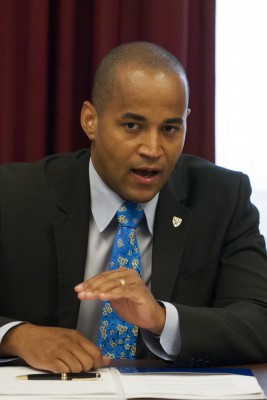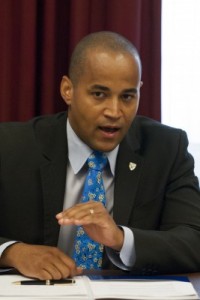
Rising Risks for Expatriates
The following post by Dante Disparte and Daniel Wagner is cross-published with IRMI In March 2012. Disparte is the CEO of Risk Cooperative and a member of ASP’s Business Council for American Security (BCAS).
Rising Risks for Expatriates
While international business assignments seldom confer diplomatic benefits, by definition, they can have political connotations, and many international assignees often find their freedom held in the balance by kidnappings, unlawful detention, and passport seizures pending charges.
In many of these examples, nationality, mission, and the implied backing of “hard currency” exacerbate the hardships borne by assignees, making statecraft and the pursuit of growth abroad inextricably connected. In most cases, the opportunity for a quick profit sees expatriates or travelers routinely shaken down at traffic stops or perhaps at the airport. In more extreme examples, there is little hope of a quick or easy release from detention, as Western nationals become unwitting soft targets in the battle against terrorism.
Humanitarians and journalists are especially vulnerable as they often carry out their work in remote and unstable regions. Their counterparts in business—especially at the upper echelons—manage to avoid many of these risks by traversing urban mazes in helicopters or armored convoys provided by private security firms.
Recent Examples
The latest example is the seizure of passports by the Brazilian government of several foreign executives of Chevron Brazil’s top management team related to last year’s oil spill. The seepage of 2,400 barrels of offshore oil last year—for which criminal charges are working their way through the Brazilian legal system—have struck a chord with the Brazilian government. This has as much to do with simply making a point (that foreign executives are not above the law in Brazil) as it does with establishing the boundaries for future operation in the oil sector by foreign firms and, of course, demonstrating how “tuned in” Brazil is to issues of environmental concern.
By contrast, BP’s foreign executives were never barred from leaving the United States following the Macondo explosion and the calamity that followed. This highlights the increasing risk that even the most senior, well-protected expatriates can find themselves pawns on the chessboard of international business and politics.
Perhaps the most celebrated recent example of this was the detention and subsequent prosecution of a senior executive and three colleagues from Rio Tinto’s mining operation in China in 2009, who found themselves front and center in a high-profile tussle between China and Australia. The employees were held on suspicion of espionage and stealing state secrets after Rio Tinto canceled a $19.2 billion investment transaction with Chinese state-owned Chinalco. The four subsequently pleaded guilty to bribery allegations, and relations between the countries and companies have continued, but this incident remains constantly in the background.
Expatriate Risk
This is really perhaps the most important point: In today’s world, business transactions and relationships do not exist in a vacuum and often help define investment landscapes. The conduct of employees and governments can ultimately have a significant impact on local operations or overall corporate performance, and reputational risk can take a real toll on profitability. All these factors jointly determine how, or whether, a company invests successfully overseas.
The fact that there may be no immunity for expatriate employees stands in contrast to their otherwise generally privileged status overseas. The concept of firm neutrality is similarly at risk, when waving a white flag or wearing a blue helmet or an emblazoned red cross is no more a symbol of safety than wearing a target. Yet, the risk of retrenchment and disengagement from the world—or specific countries—seems far greater than the likelihood of suffering from unfortunate high-profile events abroad. This is especially true if firms and their international assignees take precautions throughout the entire expatriation process.
Conclusion
It is important to remember that, while many expats may get lulled into a false sense of security—commingling with ambassadors and dignitaries in their host countries—they are not afforded a guaranteed laissez-passer in the event of an upheaval. The fact is, there is no turning back on fast-growing emerging markets, developing countries, and even disaster and relief areas. Wanderlust has long tempted mankind to take flight, discover new horizons, and make home abroad. In the century of emerging markets and frontier economies, firms and assignees should take heed to manage risks along the entire international risk continuum.
 Dante Disparte is the founder and CEO of Risk Cooperative, a strategy, risk and capital management firm focusing on mid-market opportunities, market expansion and equity investments on a global scale.
Dante Disparte is the founder and CEO of Risk Cooperative, a strategy, risk and capital management firm focusing on mid-market opportunities, market expansion and equity investments on a global scale.
Prior to forming Risk Cooperative, Mr. Disparte served as the Managing Director of Clements Worldwide, a leading insurance brokerage with customers in more 170 countries. Mr. Disparte is a specialist in strategy and risk reduction through the design and delivery of comprehensive risk solutions of worldwide scope. He is credited with designing the world’s first card-based life insurance program for the United Nations, a plan that has placed more than a half billion USD of risk with the markets in more than 150 countries. This innovation was heralded as one of the top product innovations of 2011 by the MENA Insurance Review. Mr. Disparte serves as the Chairman of the board of the Harvard Business School Club of Washington, D.C., and on Harvard Business School’s global alumni board. He is a founding member of the Business Council for American Security and an advisory member with the American Security Project.
He was formerly the Managing Director of Land Rover’s operations in 32 Sub Saharan African markets and held numerous general management roles in Denmark, where he developed applied skills in social entrepreneurship. Mr. Disparte is credited with developing a humanitarian fleet management solution that is proven to reduce the economic, environmental and social impact of humanitarian operations. This body of work is profiled in a business case published by INSEAD’s Social Innovation Centre. He served on the board of directors of Kjaer Group A/S, one of the top 10 workplaces in Europe and the top workplace in Denmark for 4 years and currently serves on the board of Communities in Schools Nation’s Capital, where he chairs the fund development committee. He is conversant in 6 languages and has published numerous articles on the subject of risk, strategy and business effectiveness. A graduate of Harvard Business School’s Program for Leadership Development, Mr. Disparte holds a degree in International and Intercultural Studies from Goucher College and a MSc. in risk management from NYU’s Stern School of Business.





